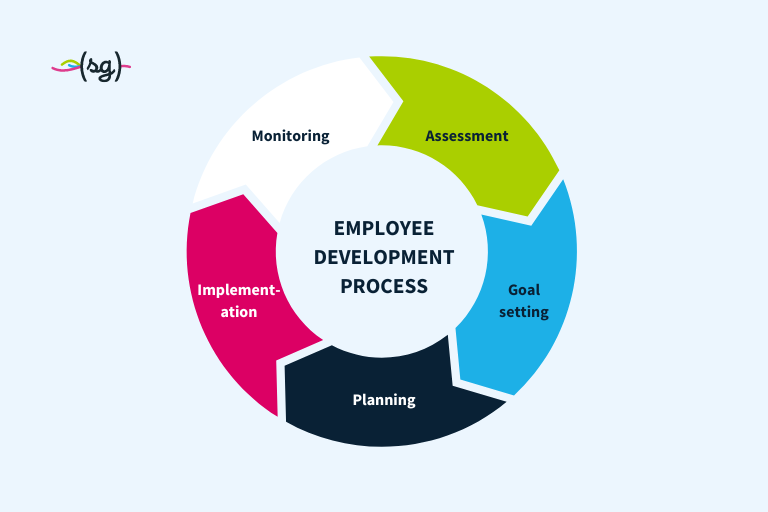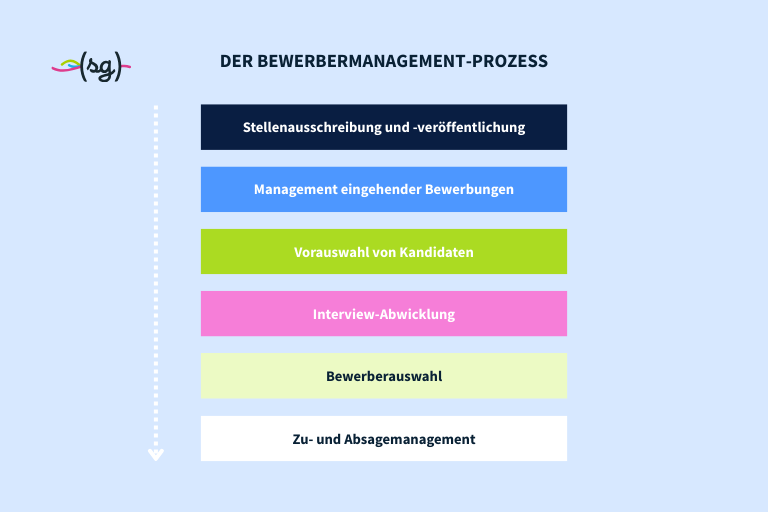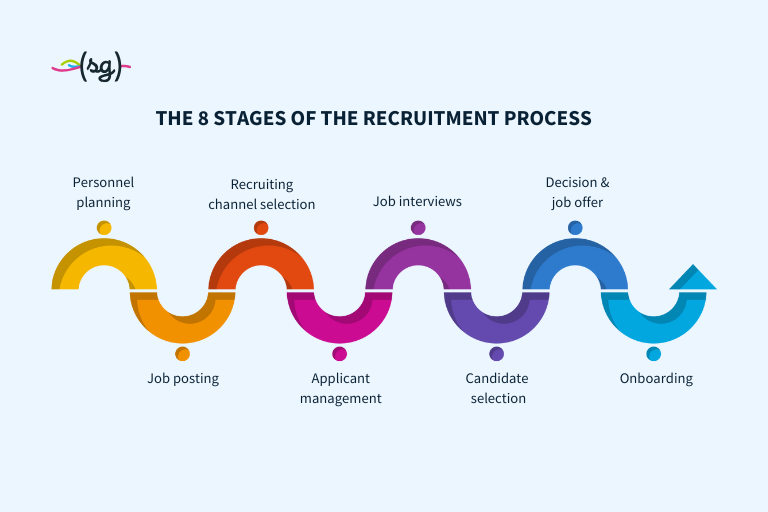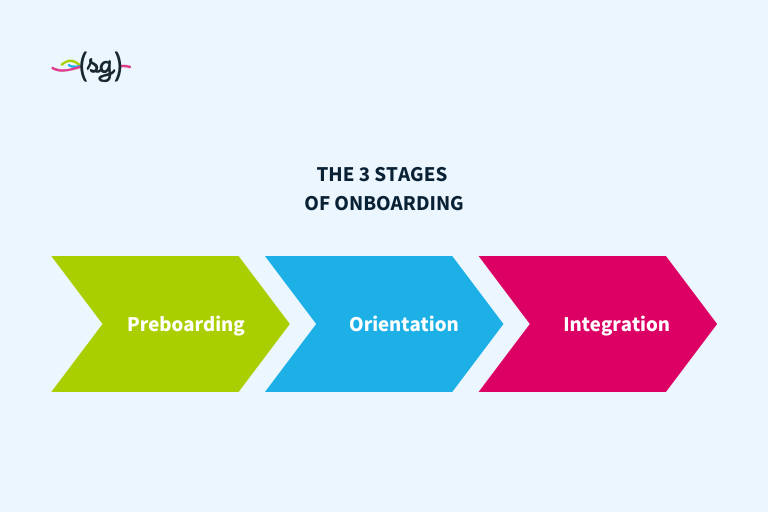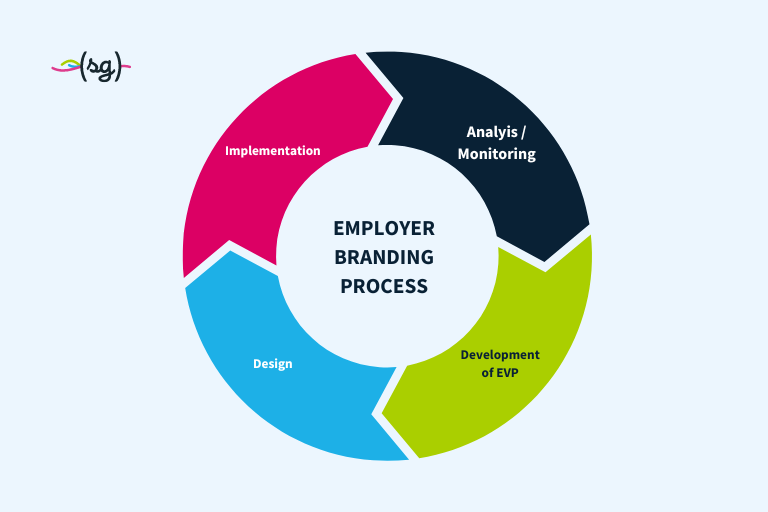Contents
- All the essentials at a glance
- Applicant management definition – What is it?
- Applicant management tasks and objectives
- Applicant management process
- What makes good applicant management?
- The importance of applicant management in times of skills shortages
- Digital applicant management
- Artificial intelligence in applicant management
- Candidate experience as a strategic success factor
- Diversity, inclusion & accessibility
- Conclusion: Rethinking applicant management
All the essentials at a glance
- Definition: Applicant management encompasses all organizational and technical processes from the job advertisement to the final decision on an application.
- The aim is to guide suitable talents through the application process in an efficient, transparent and appreciative manner.
- Professional applicant management lowers costs, reduces time-to-hire and strengthens the employer brand at the same time.
- Artificial intelligence supports the pre-selection process, the formulation of job advertisements and communication.
- A positive candidate experience is a key success factor in the competition for qualified specialists.
- Applicant management software and automation ensure faster processes and a better overview in day-to-day recruiting.
Applicant management definition – What is it?
Applicant management, or applicant administration, describes all methods, means and processes to guide applicants efficiently through the application process.
This is a sub-area of recruiting that includes job advertisements, the management of incoming applications and the associated processes, employee selection and the development of a talent pool.
The applicant management process can look different depending on the advertised position and the company looking for applicants.
Efficient applicant management is the most important prerequisite for the success of a modern recruiting strategy.
Applicant management tasks and objectives
Applicant management primarily pursues three goals:
- Time savings (reduction in time-to-hire)
- Cost savings (reduction in cost-per-hire)
- Strengthening the employer brand
Efficient processes and transparent procedures allow companies to process applications more quickly, which leads to a reduction in administrative costs. At the same time, successful communication with applicants makes a significant contribution to improving the employer brand.
Applicant management process
The modern applicant management process generally comprises these steps:
- Job advertisement and publication
- Management of incoming applications
- Preselection of candidates
- Interview processing
- Applicant selection
- Acceptance and rejection management

Of course, the applicant management process varies from company to company. However, all steps should always be designed with the candidate experience in mind.
Challenges in applicant management
Even the first glance at the applicant management process makes it clear where the challenge for modern applicant management lies: A single recruiter needs time for each of these tasks, varying depending on the process step. But of course it is not just the HR department that is involved.
Coordination of several departments is prone to errors
In many companies, different professional groups go through different application processes with more or fewer steps.
When a need for a new position arises in HR management, a job advertisement must be created and often approved in a multi-stage process
The approved position must be “translated” into a job advertisement and advertised, often internally and externally at different times.
To do this, suitable job portals or, for example, the talent pool must be made aware of the new position.
Incoming applications must be processed and stored in compliance with the GDPR and AGG.
Since the General Data Protection Regulation (GDPR) came into force, it has been clear that anyone who works with personal data bears responsibility – and this is especially true in recruiting. This is because applicant data is sensitive and often only relevant in the short term. As soon as a decision has been made, the “legitimate interest” in processing it expires – and the data must be deleted immediately.
In practice, things often look different: Applications are forwarded by email, stored in Excel spreadsheets or left in inboxes – a clear violation of the GDPR that can result in fines in the millions.
The GDPR also obliges you to do so:
- to inform applicants transparently (Art. 13 GDPR)
- to provide information about stored data – completely and immediately (Art. 15 GDPR)
- to transmit data in encrypted form and to regularly check IT security (Art. 6, 32, 34 GDPR)
Particularly important: You have a duty of proof. This means that you must be able to prove at any time that your application process complies with data protection regulations.
Would you like to know whether your applicant management already meets all the requirements? Do a self-check with our free checklist: GDPR checklist for the recruiting process
But data protection is not all that matters in applicant management: The General Equal Treatment Act (AGG) also applies. It protects applicants from discrimination – for example on the basis of age, gender, origin, religion or disability.
Therefore, pay particular attention to neutral, inclusive wording in the job advertisement and during the selection process. A sentence such as “We are looking for young, dynamic employees” can not only have legal consequences, but can also damage your image as an employer.
The Federal Anti-Discrimination Agency has published a helpful guide that can help you to create non-discriminatory job advertisements: Antidiskriminierungsstelle – Publications – Fair in den Job! – Guide to non-discriminatory recruitment procedures
Poor applicant management has a negative impact on the employer brand
An unprofessional or non-transparent application process does not remain without consequences: Applicants who feel they have been treated badly are increasingly sharing their experiences publicly – for example on review platforms such as kununu.
According to the softgarden Brand & Media 2024 study, 43.9 % of respondents stated that they had not applied to an employer because its image was too poor.
| Statement | Does not apply at all | Rather not applicable | Rather meets | Fully applicable | Applies overall |
|---|---|---|---|---|---|
| A good employer image is important to me. | 1,7 % | 6,7 % | 41,9 % | 47,2 % | 89,1 % |
| If the employer image is bad, I wouldn’t apply to an employer. | 5,7 % | 19,9 % | 39,0 % | 30,4 % | 69,4 % |
| I have not applied to an employer before because its image was bad. | 22,1 % | 17,2 % | 17,7 % | 26,2 % | 43,9 % |
These figures clearly show that negative experience reports have a direct impact on the perception of the employer brand – and therefore on the ability to attract qualified talent. This is because the candidate experience has long been a central component of employer branding.
Here is an example of the experience of one interviewee:
I applied to a large technology company that presented itself as innovative and flexible. However, the application process was impersonal and lengthy, with highly hierarchical structures and little flexibility. This discrepancy led me to decide against the company.
This statement is representative of many applicants: Only 43.8% feel that they were given a clear image of the company as an employer during the application process. The candidate experience is often contradictory – image and actual process experience do not match.
The application process is a central touchpoint of the employer brand – and holds enormous potential for optimization. Managers should be aware of this: The majority of applicants share their experiences, especially if they are negative. So if you fail to impress in applicant management, you risk damaging your reputation in the long term.
What makes good applicant management?
What do applicants really expect from an application process?
We asked 5,177 candidates as part of our Digital Application Process 2024 study – and the results are clear: speed, transparency and appreciation are at the top of the list.
| Criterion | Does not apply at all | Rather not applicable | Rather true | Fully applicable |
|---|---|---|---|---|
| Fast response times. | 1,4 % | 3,0 % | 28,6 % | 60,9 % |
| Clear application page with short loading times. | 1,6 % | 4,0 % | 27,0 % | 62,5 % |
| Good data protection. | 1,5 % | 4,1 % | 21,9 % | 67,7 % |
| In the application forms, I only have to fill in fields or upload data relating to my application. No superfluous information is requested. | 2,2 % | 6,1 % | 26,2 % | 59,9 % |
| The entire application process (submitting application documents, interview invitations, interviews, etc.) is straightforward. | 1,5 % | 2,3 % | 21,3 % | 69,7 % |
| I don’t necessarily have to submit my application via the company website, I can also use e-mail, WhatsApp or LinkedIn. | 7,5 % | 20,6 % | 32,5 % | 32,4 % |
| I know the status of the application process and the next steps at all times. | 1,7 % | 7,2 % | 30,6 % | 53,4 % |
Based on these findings, we have formulated six specific recommendations that companies can use to improve their processes and strengthen the candidate experience in the long term.
- Take the candidate’s perspective: Regularly look at the application process from the applicant’s perspective. Criteria such as data protection, simplicity, transparency and speed should be continuously reviewed.
- Get rid of ballast: Recognize outdated routines and replace them with modern, convincing processes. The aim is to attract talent and not just select it.
- Measure and improve process quality: Key figures such as time-to-hire can be used to define targets and make progress visible. Only those who measure can optimize in a targeted manner.
- Focus on speed: Short response times signal professionalism and appreciation. Speed is a decisive competitive advantage.
- Show appreciation: Appreciation begins with the first contact. Every step in the process should be respectful, clear and uncomplicated.
- Talk about good processes: A transparent and fair application process strengthens the employer brand, ideally through authentic feedback from applicants.
The importance of applicant management in times of skills shortages
In times of a shortage of applicants, the importance of applicant management grows all the more. Many companies report that they are receiving too few applications or not the right ones. The shortage of skilled workers is on everyone’s lips.
In order for your company to attract a sufficient number of the right applicants, the application process must be as simple as possible.
Your recruiting should be designed in such a way that job seekers are happy, easy and quick to join your application process and you can ultimately hire new employees more quickly.
What does this mean for your applicant management?
- Your company must present itself attractively to job seekers – this requires good employer reviews, meaningful job advertisements and a convincing, authentic careers page.
- The application process must be simple. A user-friendly website and simple application modes are important here. The current standard includes applications via Xing and LinkedIn profiles as well as mobile-optimized forms.
- The application must be processed quickly. This applies regardless of the number of vacancies or applicants. An applicant management system is extremely important here, and not just if you receive a large number of applications.
- All communication with the applicant must take place on an equal footing, from the first email to the interview and beyond.
Digital applicant management
Digital applicant management is the standard for successful recruiting today. If you are still managing applications manually via email or Excel, you are not only losing time – you also risk losing talent due to slow processes or a lack of transparency. Digital applicant management systems help you to manage all steps centrally: from the job advertisement and communication to the final decision.
The automation of recurring tasks, such as sending confirmations of receipt or interview invitations, plays a key role here. At the same time, you always have an overview of all applications, can collaborate within the team and document decisions in a comprehensible manner. This saves time, reduces errors and improves the candidate experience.
With softgarden’s applicant tracking software, you can rely on an applicant management system that is intuitive to use, can be implemented quickly and meets all the requirements of modern applicant management processes.
Artificial intelligence in applicant management
In applicant management, hundreds of applications often have to be viewed and evaluated in a short space of time. Artificial intelligence can help to efficiently analyze these large amounts of data, filter out relevant information and objectively compare applicants.
AI enables HR managers to make informed decisions more quickly – free from unconscious bias and with a focus on qualifications and fit.
Here are some examples of AI solutions that support you in applicant management:
- Automated creation of job advertisements: Recruiters can use AI to quickly and creatively generate high-quality job advertisements – including suitable wording and SEO optimization
- AI-supported applicant matching: The software supports the prioritization of candidates based on objective criteria and individual requirements.
- Automated creation of email messages: The AI provides support with automatic reply suggestions and helps to optimize the language of emails – for faster, consistent and professionally formulated communication.
- Recruiting chatbots for mobile applications: AI-supported chatbots guide applicants through the entire application process – directly via smartphone, around the clock. They answer questions, record applicant data and enable applications to be submitted in just a few minutes – without the need for traditional forms.
Tip: With softgarden, you can rely on practical AI solutions that make your day-to-day recruiting work noticeably easier: from the automated creation of convincing job ads with ChatGPT to objective applicant rankings. This allows you to make informed decisions faster – and improve the candidate experience at the same time. Find out more on our AI recruitment topic page.
Candidate experience as a strategic success factor
Today, professional applicant management is much more than just process organization – it is a key lever for a convincing candidate experience. According to our Digital Application Process 2024 study, 55.9% of applicants rate the quality of a digital application process as very important.
| Unimportant | Less important | Important | Very important |
|---|---|---|---|
| 1,3 % | 6,2 % | 33,9 % | 55,9 % |
Overall, applicants expect three main things from your application process:
- an “uncomplicated applicant management process” – including job interviews
- Good data protection
- a “clear applicant page with short loading times
This is exactly where modern applicant tracking systems come in: They enable fast, clearly structured and mobile-optimized application processes that are tailored to the expectations of the candidates.
Thanks to automated communication, real-time status displays and intuitive user guidance, applicants experience the applicant management process as professional and appreciative – a clear competitive advantage in the war for talent.
softgarden goes one step further: with the integrated feedback solution, companies can continuously improve application processes and optimize them based on data. This makes candidate experience not just an HR issue, but a strategic success factor in applicant management.
Diversity, inclusion & accessibility
Today, inclusive applicant management is more than just a sign of social responsibility – it is a clear competitive advantage. If you actively promote diversity and break down barriers, you will reach more talented people and strengthen your employer brand. This is not just about non-discriminatory selection processes, but also about digital accessibility.
According to BITV 2.0, websites, apps and digital processes of public bodies have had to be accessible since 2011. With the Barrierefreiheitsstärkungsgesetz (BFSG), this obligation will also become binding for many private-sector companies from June 2025 – and therefore directly affects recruiting.
softgarden supports you with accessible career pages. This will make your applicant management fit for more inclusion – and for the future.
Conclusion: Rethinking applicant management
Modern applicant management is much more than just managing applications – it is a strategic tool for success in the war for talent. In times of skills shortages, growing expectations of the candidate experience and increasing requirements for diversity and accessibility, efficient, digital and user-centered processes are essential.
If you want to recruit successfully today, you need an applicant management process that is fast, transparent and flexible – supported by automation, AI and clear communication at eye level. This is the only way to attract top candidates, streamline processes and strengthen the employer brand in the long term.
Do you want to take your applicant management to the next level? Then discover the solutions from softgarden now: Applicant tracking software

